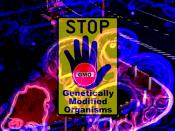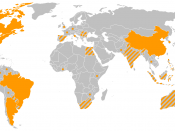840 million people throughout the world currently do not have access to adequate food supplies. (United Nations) The vast majority of these people live in undeveloped countries. Biotechnology corporations have promoted GMO's or genetically modified organisms as a possible solution to World Hunger. Most GMO's are food staple products such as rice, corn, maize, and wheat that have been modified to make them better. These modifications are wide and varied. A few examples of modifications include, increased nutrition through the addition of vitamins, the ability to repel insects, and the ability for a plant to produce its own fertilizer, and herbicidal resistance so that weeds surrounding the crops can be killed without harming the crops themselves.
Many people throughout the world have been skeptical to consume GMO's. Despite skepticism, there have been no conclusive studies that have proven that GMO's are unsafe; however, there also have been no long term studies on the potential side effects of GMO's. Many biotech corporations argue that GMO's are no different than other foods and are perfectly safe for human consumption. On the other hand, opponents of GMO's argue that it is better to study the foods in depth first, as no one can predict the ramifications of modifying the gene expression of an organism. (Playing God in the Garden) Furthermore, environmentalist organizations like Greenpeace warn against the potential ecological disaster that could result from the gene flow of modified organisms to normal crops. Such a situation could create weeds that are immune to insect predators and herbicides.
The majority of the opposition to GMO food has come from Europe. The Mad Cow Disease outbreaks of the late 1990's have caused many Europeans not to trust their government regulators. (Newsweek) As a result they are frightened...


